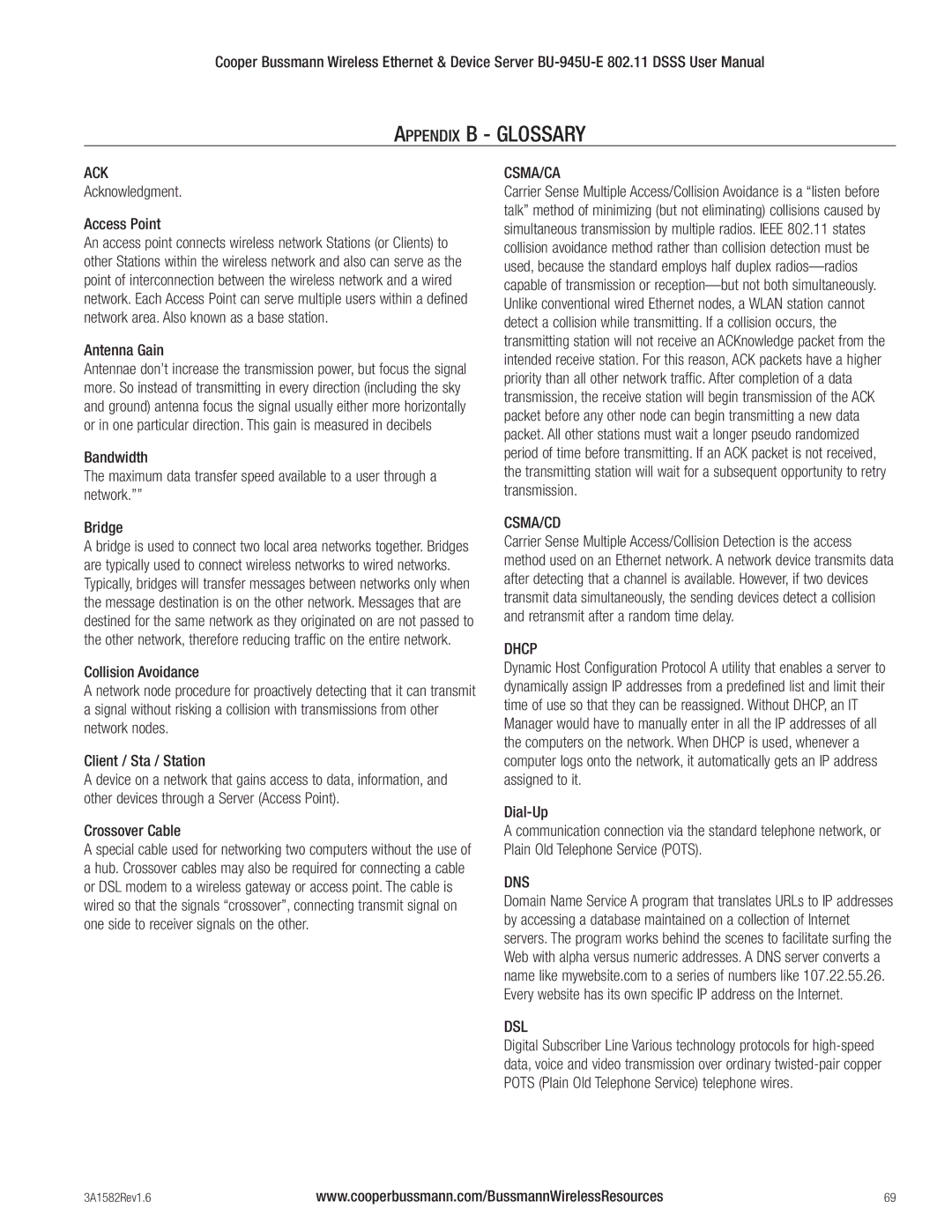Cooper Bussmann Wireless Ethernet & Device Server
APPENDIX B - GLOSSARY
ACK
Acknowledgment.
Access Point
An access point connects wireless network Stations (or Clients) to other Stations within the wireless network and also can serve as the point of interconnection between the wireless network and a wired network. Each Access Point can serve multiple users within a defined network area. Also known as a base station.
Antenna Gain
Antennae don’t increase the transmission power, but focus the signal more. So instead of transmitting in every direction (including the sky and ground) antenna focus the signal usually either more horizontally or in one particular direction. This gain is measured in decibels
Bandwidth
The maximum data transfer speed available to a user through a network.””
Bridge
A bridge is used to connect two local area networks together. Bridges are typically used to connect wireless networks to wired networks. Typically, bridges will transfer messages between networks only when the message destination is on the other network. Messages that are destined for the same network as they originated on are not passed to the other network, therefore reducing traffic on the entire network.
Collision Avoidance
A network node procedure for proactively detecting that it can transmit a signal without risking a collision with transmissions from other network nodes.
Client / Sta / Station
A device on a network that gains access to data, information, and other devices through a Server (Access Point).
Crossover Cable
A special cable used for networking two computers without the use of a hub. Crossover cables may also be required for connecting a cable or DSL modem to a wireless gateway or access point. The cable is wired so that the signals “crossover”, connecting transmit signal on one side to receiver signals on the other.
CSMA/CA
Carrier Sense Multiple Access/Collision Avoidance is a “listen before talk” method of minimizing (but not eliminating) collisions caused by simultaneous transmission by multiple radios. IEEE 802.11 states collision avoidance method rather than collision detection must be used, because the standard employs half duplex
CSMA/CD
Carrier Sense Multiple Access/Collision Detection is the access method used on an Ethernet network. A network device transmits data after detecting that a channel is available. However, if two devices transmit data simultaneously, the sending devices detect a collision and retransmit after a random time delay.
DHCP
Dynamic Host Configuration Protocol A utility that enables a server to dynamically assign IP addresses from a predefined list and limit their time of use so that they can be reassigned. Without DHCP, an IT Manager would have to manually enter in all the IP addresses of all the computers on the network. When DHCP is used, whenever a computer logs onto the network, it automatically gets an IP address assigned to it.
A communication connection via the standard telephone network, or Plain Old Telephone Service (POTS).
DNS
Domain Name Service A program that translates URLs to IP addresses by accessing a database maintained on a collection of Internet servers. The program works behind the scenes to facilitate surfing the Web with alpha versus numeric addresses. A DNS server converts a name like mywebsite.com to a series of numbers like 107.22.55.26. Every website has its own specific IP address on the Internet.
DSL
Digital Subscriber Line Various technology protocols for
3A1582Rev1.6 | www.cooperbussmann.com/BussmannWirelessResources | 69 |
